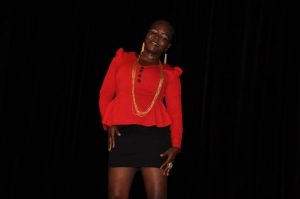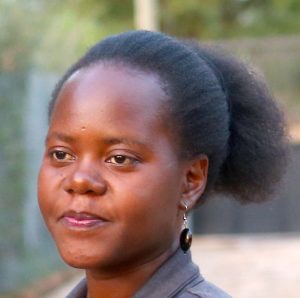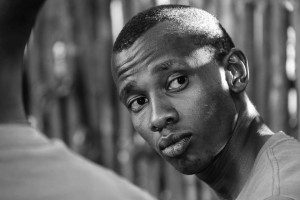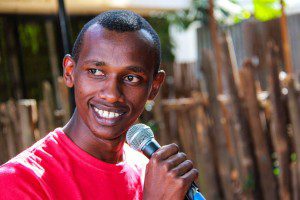Harriet Anena is the Online ContentProducer at the African Media Centre for Excellence and the author of A Nation InLabour, a poetry collection. She’s also a guest at the #Babshai2016 Poetry Festival from 24-26 August in Kampala.

Anena, your production, “I Bow for my Boobs,” was described as Political Erotica. Would you say this was an accurate description?
Yes. I deliberately framed the performance around political erotica. First, because my upcoming poetry collection is centered on political erotica. Secondly, politics and erotica are provocative topics on their own and even more provocative when merged; and considering Uganda is just walking off a hot political podium, I thought it relevant to focus the performance on the politics and erotica theme.
What were some of the most surprising reactions to that performance?
I sort of expected most of the reactions to the performance – the shock, the awe and the pats on the back. After my first week of rehearsal, I was sure the person going on stage would not be Harriet Anena but someone new, someone has known before; someone no one suspects exists; except my director. The only reaction that surprised me was that people found the performance humorous. There was laughter throughout the performance and I could hear a laugh first and a sad sigh later as I performed the central poem of the day, I Bow for My Boobs’, in which I breakdown.
Have people expressed incredulity at how there is an overt difference between your art and your demeanour?
Yes. A lot of people who have interacted with me know Anena is reserved; speaks only when she has to; shies away from crowds and is not the type who will be in your face. What they saw on stage was a different Anena. Some of the questions I got after the show was; ‘What did you drink before the performance?’ and ‘Was that really you on stage?”. It’s a pleasant reaction, which I still continue to receive, and I largely credit my director, Elizabeth Pamela Acaye, for it. She literally dug me out of my cage, ensured I immersed myself in my poetry so I can lift them off the page to the stage.
What are some of your biggest fears as a poet?
My greatest fear has been whether I could ever perform my poems on stage and do it as well as I have done on paper. I think I’m on the way to overcoming that fear wholly, soon. Presently, the looming legal restrictions on how artists can express themselves, through the anti-pornography law, is what has been bothering my mind. I do hope we’ll find a way around it because as it stands, the law is ‘unimplementable’ and a mere diversion from more crucial things facing Uganda.
In an ideal world, how different would poets be than they are today?
In an ideal world, poets would live on poetry ALONE.
What are some of your expectations at the Babishai Poetry Festival?
I hope to see more Ugandans – young and old – converging to celebrate poetry and participate in the various activities and events at the festival.
When it comes to food, what in your opinion, should poets feed on?
Hahaha I love sweet bananas, Odii and sugarcane. Try it out.
Any parting remarks?
I am delighted and encouraged at the expanding spaces for poetic expressions, especially in Kampala today. I’m hoping the wave of poetry sweeps across the country and extends to upcountry areas. Poetry is all around us, we just need to be awaken to see it, feel it, live it. Together, we can make poetry a movement in Uganda and beyond.
Thank you!
The #Babishai2016 Poetry Festival runs from 24-26 August in Kampala. For details, visit www.babishainiwe.com or email, festival@babishainiwe.com


